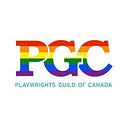Featured Member — Donna-Michelle St. Bernard
*Each month we interview member playwrights to share their work, stories and inspiration with the community. We recently spoke with Donna-Michelle St. Bernard, aka Belladonna the Blest, an emcee, playwright and agitator. Her main body of work, the 54ology, includes: Cake, Sound of the Beast, A Man A Fish, Salome’s Clothes, Gas Girls, Give It Up, The Smell of Horses, and The First Stone. Commissioned works include Witness Shift (Obsidian Theatre, 21 Black Futures), Reaching For Starlight (Geordie Theatre), Say the Words (Wrecking Ball), The House You Build (SNTC). Opera libretti include Forbidden (Afarin Mansouri/Tapestry Opera) and Oubliette (Ivan Barbotin/Tapestry Opera). DM has collaborated on the creation of Hope Is A Story with Sunny Drake, They Say He Fell with Nir Bareket and 501: Toronto in Transit with Justin Manyfingers and Bob Naismith. She is co-editor with Yvette Nolan of the Playwrights Canada Press anthologies Refractions: Solo and Refractions: Scenes, as well as editor of Indian Act: Residential School Plays.
DM is currently the emcee in residence at Theatre Passe Muraille, associate artist at lemonTree Creations, artistic director of New Harlem Productions, coordinator of the AD HOC Assembly, and of Nightwood Theatre’s Write From the Hip play development program. She’s aight. (photo by Graham Isador)
Tell us a bit about yourself, and how you got your start writing plays.
I have always been most at ease in text-based expression, finding my way into poetry, prose, sketch comedy and, obvs, hip hop. I stumbled into playwriting after witnessing the narrative power of the form from my vantage as Native Earth’s administrator. Alongside everything I was absorbing there, I figured myself out in development programs at Obsidian, bcurrent, FU-gen, SpringWorks. I watched and read all the theatre I could stand and tried to understand what landed with me, why. Considered what remained to be said. Really, I got started by writing a first thing, being not entirely satisfied, trying to do better next time. That brings us to where I am now.
Who/what inspires you to write plays?
I am inspired by a story that has not been told enough. By a story that has been told, but seems to have missed the point. By the smallest little thing that means the most to me, and I want to explain why.
I am motivated by the Don’t people, the You-Can’t people, and even the tentative I’d-Rather-You-Didn’t people. As if.
I am committed to justifying the investment of my mentors, advocates and collaborators.
Can you tell us about your recent experience curating Empowering Body and Place — how did you approach that project, and what does it mean to you?
Embodying was a big project for me, as curator and dramaturge. When the work of the commission on MMIWG was curtailed, I felt a deep urgency to protect the stories in the report from becoming data, for archiving but never acting on. The invitation for artists to contribute tried to honour the intentions and identities of those who contributed to the report by considering diversity of region, nation, generation, discipline. The works were commissioned with the understanding that this task far exceeds story creation — it is a wound-making work, to revisit a record of cumulative trauma. The prevalence of MMIWG means it is likely the work will always share space with folks affected personally. I am very proud of this project’s outcome, and grateful to the artists who actually did the work: Janet Antone, Reneltta Arluk, Tara Beagan, Yolanda Bonnell, Darla Contois, Deborah Courchene, Aria Evans, Eekwol Lindsay Knight, Jessica Lea Fleming, Falen Johnson, Émilie Monnet, Yvette Nolan, Michelle Olson, Natalie Sappier, jaye simpson and Aqua Nibii Waawaaskone. Chi Migwetch to elder Pauline Shirt for helping us to have a safe journey.
What are you working on next?
Right this second I am in workshop with The First Stone, in development at New Harlem. The team is intense. The play draws from the experience of former child abductees in Uganda. We are crafting movement, sound and design through exploration of text, and engagement with the themes through the Community Justice Forum. The play holds inside of it the question that is abolition’s biggest barrier: if we don’t put people in jail, what do we do? I think it is worth asking… and even more worth answering, because we can’t go on like this.
What do you look for in creative collaborators, and what are the benefits and difficulties of working collaboratively in theatre?
I rely on my collaborators to show me something I couldn’t see without their lens. The artists I choose to work with are offering something into that dialogue: affirmation, interpretation, friction, illumination, dick jokes. I want to work with people who have vision of their own, but can also see mine, and build with me.
Working collaboratively is inescapable in the theatre. You can’t push all the buttons. So it becomes a matter of how that collaboration is shaped. The play thrives on a shared understanding, which can’t take place between me and myself. It requires that two or more of us derive value from what we have built. The more open the forum, the more space for others to contribute, the more likely we are, together, to come upon the most impactful way of conveying.
What is your favourite Canadian play?
Annie Mae’s Movement by Yvette Nolan. I have read it, heard it, seen it and still feel it every time — not always the same feeling, not always in the same place. That’s a piece of magic for me.
Disclaimer: Playwrights Guild of Canada (“PGC”) is a national arts service mandated to engage and grow an active Canadian writing community. We promote Canadian plays around the world to advance the creative rights and interests of professional Canadian playwrights for the stage. The views of our members are their own. The opinions of PGC as an association remain neutral.
